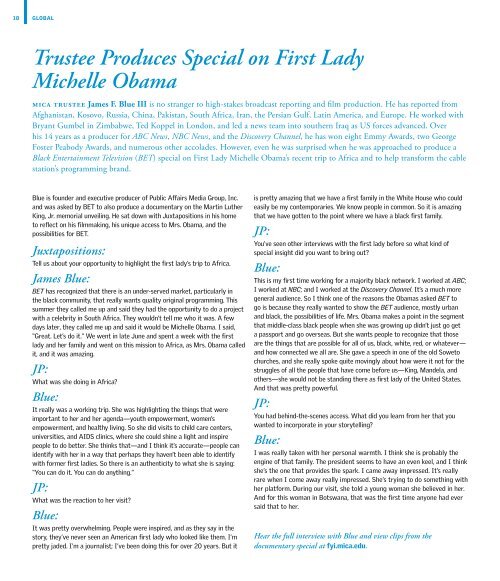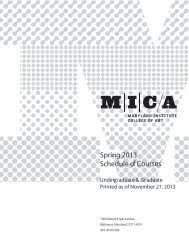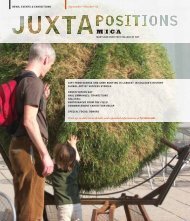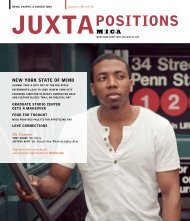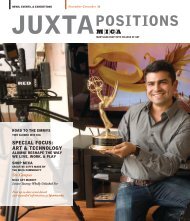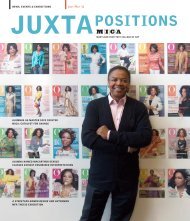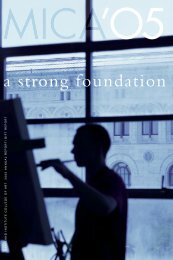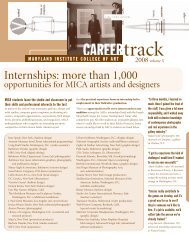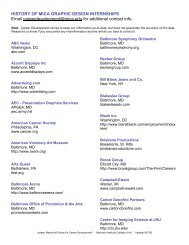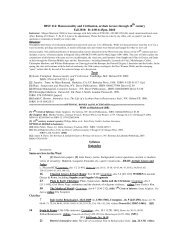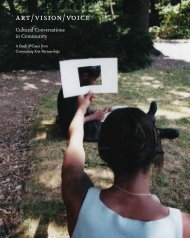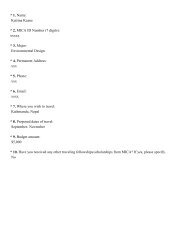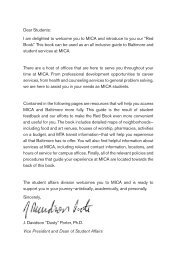Nov.-Dec. 2011 - Maryland Institute College of Art
Nov.-Dec. 2011 - Maryland Institute College of Art
Nov.-Dec. 2011 - Maryland Institute College of Art
You also want an ePaper? Increase the reach of your titles
YUMPU automatically turns print PDFs into web optimized ePapers that Google loves.
18 GLOBAL<br />
Trustee Produces Special on First Lady<br />
Michelle Obama<br />
miCa trustee James F. Blue III is no stranger to high-stakes broadcast reporting and film production. He has reported from<br />
Afghanistan, Kosovo, Russia, China, Pakistan, South Africa, Iran, the Persian Gulf, Latin America, and Europe. He worked with<br />
Bryant Gumbel in Zimbabwe, Ted Koppel in London, and led a news team into southern Iraq as US forces advanced. Over<br />
his 14 years as a producer for ABC News, NBC News, and the Discovery Channel, he has won eight Emmy Awards, two George<br />
Foster Peabody Awards, and numerous other accolades. However, even he was surprised when he was approached to produce a<br />
Black Entertainment Television (BET) special on First Lady Michelle Obama’s recent trip to Africa and to help transform the cable<br />
station’s programming brand.<br />
Blue is founder and executive producer <strong>of</strong> Public Affairs Media Group, Inc.<br />
and was asked by BET to also produce a documentary on the Martin Luther<br />
King, Jr. memorial unveiling. He sat down with Juxtapositions in his home<br />
to reflect on his filmmaking, his unique access to Mrs. Obama, and the<br />
possibilities for BET.<br />
Juxtapositions:<br />
Tell us about your opportunity to highlight the first lady’s trip to Africa.<br />
James Blue:<br />
BET has recognized that there is an under-served market, particularly in<br />
the black community, that really wants quality original programming. This<br />
summer they called me up and said they had the opportunity to do a project<br />
with a celebrity in South Africa. They wouldn’t tell me who it was. A few<br />
days later, they called me up and said it would be Michelle Obama. I said,<br />
“Great. Let’s do it.” We went in late June and spent a week with the first<br />
lady and her family and went on this mission to Africa, as Mrs. Obama called<br />
it, and it was amazing.<br />
JP:<br />
What was she doing in Africa?<br />
Blue:<br />
It really was a working trip. She was highlighting the things that were<br />
important to her and her agenda—youth empowerment, women’s<br />
empowerment, and healthy living. So she did visits to child care centers,<br />
universities, and AIDS clinics, where she could shine a light and inspire<br />
people to do better. She thinks that—and I think it’s accurate—people can<br />
identify with her in a way that perhaps they haven’t been able to identify<br />
with former first ladies. So there is an authenticity to what she is saying:<br />
“You can do it. You can do anything.”<br />
JP:<br />
What was the reaction to her visit?<br />
Blue:<br />
It was pretty overwhelming. People were inspired, and as they say in the<br />
story, they’ve never seen an American first lady who looked like them. I’m<br />
pretty jaded. I’m a journalist; I’ve been doing this for over 20 years. But it<br />
is pretty amazing that we have a first family in the White House who could<br />
easily be my contemporaries. We know people in common. So it is amazing<br />
that we have gotten to the point where we have a black first family.<br />
JP:<br />
You’ve seen other interviews with the first lady before so what kind <strong>of</strong><br />
special insight did you want to bring out?<br />
Blue:<br />
This is my first time working for a majority black network. I worked at ABC;<br />
I worked at NBC; and I worked at the Discovery Channel. It’s a much more<br />
general audience. So I think one <strong>of</strong> the reasons the Obamas asked BET to<br />
go is because they really wanted to show the BET audience, mostly urban<br />
and black, the possibilities <strong>of</strong> life. Mrs. Obama makes a point in the segment<br />
that middle-class black people when she was growing up didn’t just go get<br />
a passport and go overseas. But she wants people to recognize that those<br />
are the things that are possible for all <strong>of</strong> us, black, white, red, or whatever—<br />
and how connected we all are. She gave a speech in one <strong>of</strong> the old Soweto<br />
churches, and she really spoke quite movingly about how were it not for the<br />
struggles <strong>of</strong> all the people that have come before us—King, Mandela, and<br />
others—she would not be standing there as first lady <strong>of</strong> the United States.<br />
And that was pretty powerful.<br />
JP:<br />
You had behind-the-scenes access. What did you learn from her that you<br />
wanted to incorporate in your storytelling?<br />
Blue:<br />
I was really taken with her personal warmth. I think she is probably the<br />
engine <strong>of</strong> that family. The president seems to have an even keel, and I think<br />
she’s the one that provides the spark. I came away impressed. It’s really<br />
rare when I come away really impressed. She’s trying to do something with<br />
her platform. During our visit, she told a young woman she believed in her.<br />
And for this woman in Botswana, that was the first time anyone had ever<br />
said that to her.<br />
Hear the full interview with Blue and view clips from the<br />
documentary special at fyi.mica.edu.


